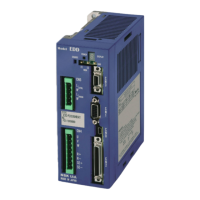12. Troubleshooting
— 12-1 —
12. Troubleshooting
12.1. Identifying Problem
If problems have been occurred, check the items shown in “Table 12-1: Items to be checked when a
problem occurs.” When reporting problems to the NSK sales or representative, the explanation of the
items in “Table 12-1: Items to be checked when a problem occurs” will help us to identify them.
Table 12-1: Items to be checked when a problem occurs
Check the combination of the
Motor and the Driver Unit
Check if the following items on the nameplates of the Motor and the Driver Unit conform to
each other: the Motor series code, the Motor size number, and the Maximum torque code.
Refer to “3.1.2. Motor and Driver Unit Model EDD Combinations” for details.
Check the voltage variation of the power source.
Confirm the frequency of occurrence.
[Example]: Once/ every one hour
Several times/week
Occurrence in special occasion
At what particular occasion does the problem occur?
[Example]
• When welding process is performed in the proximity.
• When the Motor is accelerating.
• Occurs at the same position.
State of warning and alarm
The state of alarm of warning can be checked with the command TA (TA/HI: Tell alarm).
(Refer to “11.1. Identifying Alarm and Warning”. )
12.2. Troubleshooting
Refer to a relevant chapters listed below for details.
Table 12-2: Failure State
Vibration, Abnormal noise, and
unstable motion
“12.2.3. Vibration, Abnormal Noise or Unstable Settling”
“12.2.4. Improper Positioning”
“12.2.5. RS-232C Communication Problem”

